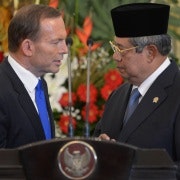Will Shorten's 'hunger' be enough?
Bill Shorten has cast himself as a strong retail politician but distanced himself from a presidential style, in at last formally announcing his bid to lead Labor in opposition.
Shorten, from the right, told a news conference today that he had the passion, commitment and ideas to lead “both inside the parliament, but even more importantly, outside the parliament, to campaign for Labor and our positive vision for the future”.
The former union heavyweight who has been touted as a likely ALP leader since entering parliament in 2007, said Labor’s vision for the future “should be as important to us as holding the Coalition to account for their actions”.
In his pitch he drew implicit, but not explicit, contrasts with Anthony Albanese, who has not yet declared, but is likely to run. One of the arguments for installing Albanese has been that he would, as a very effective parliamentary performer, take the fight strongly up to the new government in the House.
“Our challenge in opposition will not just be to be negative and hold the government to account – it will be to be positive and optimistic about our future.”
Shorten also referred to his energy, when it is known that one of the questions in Albanese’s mind has been whether, after a very difficult six years, he has sufficient energy to gear up for what is often said to be the most difficult job in federal politics.
“I believe I bring energy, I bring optimism, I’m hungry for victory and these are qualities which are important to make Labor competitive to win the next election,” Shorten said.
He named New South Wales left-winger Tanya Plibersek, the outgoing health minister, as his preferred deputy. Plibersek is regarded as a good public performer. With Shorten from Victoria, having her as deputy would also ensure continued representation of NSW in the leadership duo. Albanese, currently deputy, is from NSW and that is the mainland state where Labor will have most rebuilding to do during this term.
Shorten at the weekend was reluctant to enter a contested ballot, which would be decided on a 50-50 basis by the caucus and the ALP membership at large. But as Albanese continued to weigh his options, Shorten let it be known that he would run for leadership regardless of what Albanese decided. Albanese, from the left, would be favourite to win the vote among the rank and file of the party.
The new involvement of the rank and file, by introduced by former prime minister Kevin Rudd, is controversial within the party. Former Senate leader Stephen Conroy this week has condemned the new rules as “a farce” that would make the party “an absolute laughing stock”.
Shorten said Labor could win the next election, that it should not assume it had to be in opposition for too long. The party had to reach out beyond its traditional constituencies.
“Labor will need to reignite the passion of our base,” he said. But it also must “reach out to new constituencies – farmers, small business, professional women, pensioners. We need to reach out and engage with all sorts of groups to form the broadest possible movement so that the Labor Party can truly be the party of all Australians.”
Labor had not just lost because of disunity, “although I think that perception certainly stopped people from listening to us on other matters”. Some policies would have to be revisited.
He strongly supported Labor’s carbon price policy, while not making an absolutely firm commitment to vote against the Abbott government’s repeal of it. What Labor’s tactics should be has become a matter of debate within the party this week.
Labor had a mandate for its views about carbon pricing, Shorten said. When asked about the Coalition’s mandate to repeal it he said, “This may be the case of duelling mandates. But just because the Coalition obtained more votes than the Labor Party doesn’t mean that the Labor Party ceases being the Labor Party … Labor shouldn’t stop pursuing its issues merely because someone else has a different idea.”
He named the Labor policies he thought were good ideas: the national broadband network; carbon pricing; fair go workplace policies; better schools; and a national disability insurance scheme.
After Labor has just come out of an election campaign which was deliberately pitched as presidential, Shorten stressed the need for a team effort.
“It won’t fall to one person to win the next election. It will be a team effort and so I believe that one of my jobs, if chosen to be leader, will be to energise and organise the Labor team, because many hands make light work.”
Addressing the issue of his role in bringing down Kevin Rudd and then Julia Gillard, he said he had always acted with the best interests of the Labor Party at heart. “The Labor Party must always do its utmost to be competitive, that is what has driven my actions.”
A line needed to be drawn under past divisions.
Against the background of many calls for Rudd to leave parliament, Shorten said this was entirely up to him. “I’m grateful for Kevin Rudd’s efforts to make sure Labor is a fighting force,” he said.![]()
This article was originally published at The Conversation. Read the original article.
















